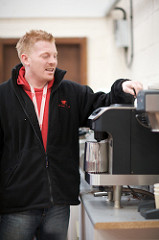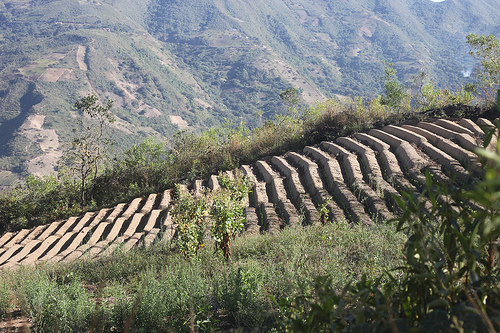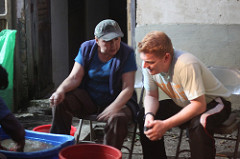Guest post by Stephen Leighton from Has Bean coffee about specialty coffee

So who am I? My name is Stephen Leighton and I’m the owner and head roaster at Has Bean Coffee based in Stafford. Has Bean is an online retailer, roasting and selling fine specialty coffees from all around the world direct to home consumers. So, before I go into the main part of why Zach has kindly let me guest post here, here are some basic:
What is specialty coffee?
Specialty coffee—simply—is coffee that is grown for the specialist market. It differs from coffees grown for the commodity, mass-produced market in price and quality. Specialty coffee is bought by conscientious importers and roasters who care about the sustainability (of course this is a broad brush and there are some unscrupulous buyers) of the product they are buying. If a fair price isn’t paid then it ceases to exist.
Fair Trade is fair enough isn’t it?
Fair Trade in the commodity market is indeed fair—much fairer than the prices they would normally get. It also imposes guidelines for growers to have social programs to look after the people that work for them and the environment. But in the specialty sector of the market, Fair Trade has no place as prices paid to farmers are much greater than the Fair Trade price. In a very sustainable way, good products fetch higher prices that can be fed down the line.
What about the social responsibility for non-Fair Trade coffee?
Well, you tend to find that good people sell good coffee: its just the way it tends to go. Good farms need good people to pick because quality in selection is vital. These people demand good conditions and good wage; and they themselves are rare commodity.
But to make sure of this there is nothing like going to visit the farms.
This post is about one of these visits and the coffee that came from it. This is no hard sell—we don’t even have any of this coffee yet—but an insight into what it takes to find coffee and what relationships go into this.

Back in 2008 I was invited to go and be a judge for a program called the Cup of Excellence that was being held in Bolivia. This was my second time in Bolivia judging this competition (the previous being back in 2006) and one of many jury’s I have participated in. Bolivia is one of the best-kept secrets in the coffee world: small farms great altitude make for a fantastic climate. Unfortunately, coffee buyers are put off by the unstable economy and political situations along with the issues of coca and illicit drugs that are legally allowed to be grown in Bolivia.
At the end of the competition, we had cupped many coffees over and over again and one, for me, really stood out. But until you get home from the competition, you really don’t get to find out which farms are which. Before we left, we went to an event where the farmers could meet the jury members and ask them questions. I remember this particular time, it was being held in what could only be called a greenhouse, and it was sweltering. Being of fair skin and not being good with the sun, many breaks for me were taken to creep outside to a breeze. On one occasion, I got talking to one of the farmers who spoke great English. It was his first time competing and he didn’t know where he had finished, but was just proud to have made it to the international jury. We chatted and swapped business cards and went on our way.
When I arrived home, I dived into my emails and there was one from this chap just saying he was pleased to meet me and that he hoped I had travelled safely home. Intrigued by this contact, I got my cupping scores out and was able to match my scores to the coffees we had cupped. I found that not only had Mario’s coffee made it to the finals, but it was the one coffee that had stood out head and shoulders for me in the cuppings.
Excited by this, I waited in anticipation for the auction of this coffee—hoping we would be able to secure it. With a lot of jostling and a really high bid, we were able to fight off the competition and secure the lot.
Negotiations ensued, and we have taken all of the coffee from the farm ever since! We also found out that we are the only people ever to buy the coffee. In the past they had never been able to find a route for their fabulous coffee to market.

But I had never been to the farm, so this year I decided it was time to do so. So I made a marathon journey of 36 hours from home in the UK to La Paz, then another 3 hour car journey to the farm.
I spent the whole week picking with the pickers eating with the family, living on the farm, in the community. I kept a diary of my time there at the links at the bottom of this post, so I wont repeat whats already been written, but it was amazing! The local community heard I liked football so arranged for us to play a game of farm workers and me against the community. Afterwards we spent the evening chatting and drinking beers watching the sun go down. Truly magical.
We also recorded a special video for our weekly videocast we do called “In My Mug” which you can see below (link here if it doesn’t load for you):
So when we get asked: “Do you do Fair Trade coffee?” we push out our chest and say “No! We can do better than that.”
This article © 2010 Stephen Leighton; all rights reserved. Images via flickr licensed as stated and used here with the author‘s kind permission.
